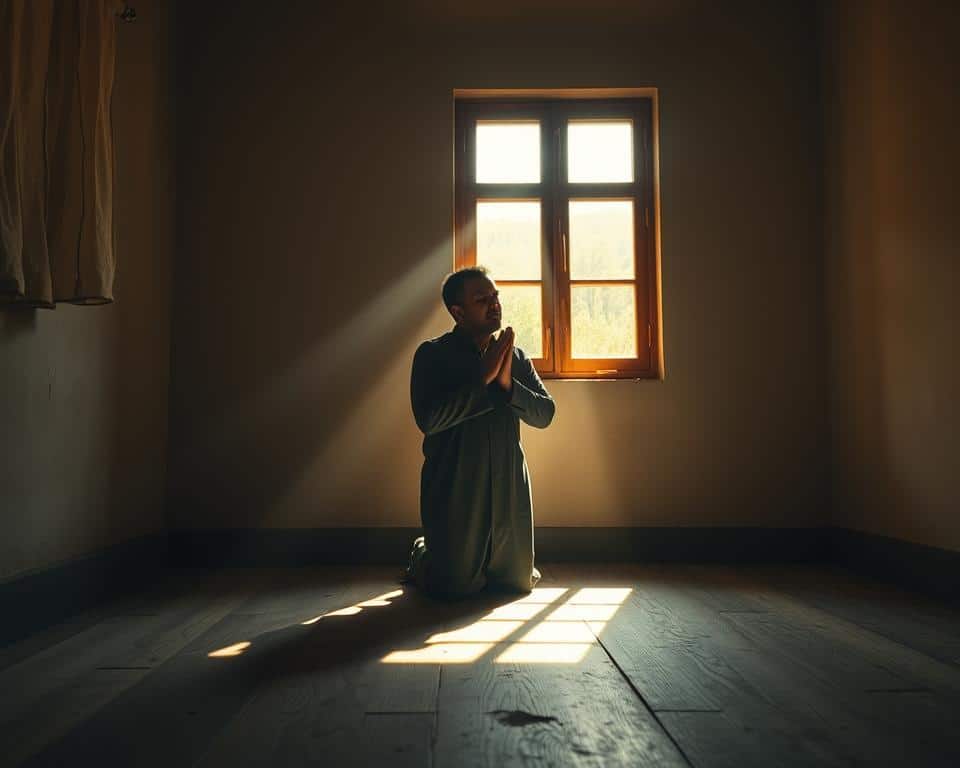“There is more to life than increasing its speed.” — Mahatma Gandhi. I begin with that line because it names the problem I see in my own week: hurry. I write as someone who follows Scripture and who watches research that points to a weekly day set apart.
I aim to show, in plain steps and clear evidence, how a weekly pause supports my mind and body. I draw on research from Loma Linda and cohort studies that link faithful practice with longer life and better mental health. I also cite an eight-week trial that found lower anxiety and less worry.
In this guide I will explain physical, mental, and relational gains. I will give simple, practical tips you can try this time—planning meals, unplugging, walking outside, and gathering with friends. My goal is to offer answers you can use this week, rooted in God’s word and in real data.
Key Takeaways
- I set the guide’s aim: show how a weekly day supports mind and body with clear steps.
- God’s word calls us to a weekly pause that brings tangible gains.
- Field research links Sabbath keeping with longer life and better mood.
- Short trials report lower stress, anxiety, and improved well-being.
- Practical tips include planning, unplugging, nature walks, and company.
- I invite you to try this for several weeks and watch how your life changes.
What Sabbath rest means in daily life
I follow a simple weekly rhythm. Six days I do tasks and one day I stop. That pause is a 24-hour block I set aside for God and for ceasing from work.
Genesis 2:1-3 shows God created for six days and then blessed the seventh day. Exodus 20:8-11 frames the commandment that calls us to stop labor and remember God as Creator and Redeemer.
I name what cease from work looks like at home. I pause job tasks, chores, email, and errands. I protect time to pray, attend worship, read God’s word, and sit in quiet.

- I define sabbath rest as a weekly 24-hour block set apart for God and stopping work.
- I treat the sabbath day as holy, following how god created the seventh day.
- Keeping sabbath is a gift that orders the week and brings peace to our home.
| Practice | What I stop | What I do |
|---|---|---|
| Preparation | Errands, cleaning | Prep meals, set boundaries |
| Cessation | Job tasks, email | Prayer, worship, Scripture |
| Rhythm | Seven busy days | Six work days, one sacred day |
Health benefits of Sabbath rest
When I set aside one full day, my heart and immune system show concrete gains.
Lower blood pressure and calmer heart rate. Regular pause days ease cortisol. That reduction helps lower blood pressure and steady heart rate. Over time this change supports better physical health and fewer stress symptoms in the body.

Stronger immune response and faster healing. Weekly physical rest gives immune cells time to recover. I get fewer colds and heal faster after procedures or busy weeks.
Better cardiovascular markers and longer life. Loma Linda and Blue Zones research link weekly practice with lower coronary artery disease and up to a decade longer life in some groups. These physical benefits build month by month.
“A true pause eases wear on the body and restores energy for the week ahead.”
- Reduced inflammation drivers that harm long-term health.
- More energy for six active days after one full day off.
- I urge planning so the body can actually stop and recover.
Mental health benefits you can feel this week
Lower stress and cortisol through regular rest
Protecting one day lowers daily stress load. When I stop work and screens, I notice calmer breathing and softer thinking. Reduced cortisol shows up as steadier moods and less tension.
Reduced anxiety and worry during a weekly pause
Stepping out of constant demands cuts anxious thinking. An eight-week Liberty University study found drops in anxiety and worry for people who kept a weekly pause. I pair quiet time with prayer to steady my reactions.
Improved mood, energy, and focus after a day off
A full day off restores focus and lifts mood the next morning. I sleep well and keep the day free from work talk. That simple hold makes me more productive and hopeful on Monday.
Greater self-awareness from reflection and quiet
Quiet moments let me notice recurring thoughts and choose better responses. I keep a short gratitude list to train attention toward truth and hope. That practice builds better mental habits over weeks.
| Benefit | Action | Evidence |
|---|---|---|
| Lower stress | Unplug, breathe, protect sleep | Physiological cortisol decrease reported in pause studies |
| Less anxiety & worry | Prayer, quiet reflection | Liberty University 8-week study showed reduced anxiety |
| Renewed focus | Full day off, no work talk | Adventist Health Study links weekly rhythms to better mental health |
| Emotional steadiness | Gratitude list, Scripture reading | 2011 experimental study: prayer reduced anger and aggression |
Stronger relationships with family and friends
A weekly pause clears space for real conversation and slower rhythms with those I love. When life usually rushes, protecting a day gives us room to notice one another again.
Unrushed time with family and small group people
Plan long meals and simple gatherings. I set aside enough time so meals become conversations, not quick stops. That choice invites laughter, story, and shared prayer.
More presence in marriage and parent-child bonds
I put my phone away and look people in the eye. Small acts—shared walks, a short game, or honest talk—build trust in marriage and with children.
- I plan unrushed meals so my family can talk and laugh without hurry.
- I set my phone aside to give full attention to the people in the room.
- I meet with a small group to read Scripture and pray, which builds steady friendship.
- I invite a neighbor or friend for a simple walk to grow connection.
| Focus | Action | Result |
|---|---|---|
| Family meals | Serve a shared meal and ask open questions | Deeper conversation and mutual care |
| Marriage | Take a quiet walk or talk without devices | More presence and trust |
| Small group people | Gather to read Scripture and pray | Steady friendship and encouragement |
| Children | Give eye contact and play | Stronger parent-child trust |
Why rest can boost productivity on work days
A clear weekly pause changes how I perform on work days. When my mind has true downtime, I return faster and make fewer errors.
Burnout saps focus and slows output. Taking one day to stop lets attention reset. That reset helps me switch tasks with less friction during the week.
I find ideas surface on the day off because my mind is not under pressure. Better decisions follow because stress is lower and thinking is clearer.
- I work faster with fewer mistakes after a solid day away.
- Consistent sleep and recovery improve reaction time and memory on busy days.
- Stepping back helps me see which tasks matter and which do not.
- Keep sabbath as a boundary so your best energy serves the other six days.
These practical ways to guard the day—planning ahead, unplugging, and saying no to small tasks—let the benefits sabbath brings grow over time. The week that follows feels more sustainable and life feels ordered by truth rather than hurry.
Spiritual practices that renew the heart
Each week I choose simple practices that steady my heart and sharpen my faith. These acts are short and clear. They help me find answers in Scripture and calm for the week ahead.
Prayer that eases anger and supports mental health
I set time for quiet prayer because it calms the heart and lowers tension. Studies note prayer can reduce anger and steady breathing after provocation. I ask God for wisdom and write the answers I sense from Scripture.
Corporate worship that builds hope and connection
I gather with my church to sing and read God’s word. Shared praise lifts hope and ties my life to a caring body. Singing and confession soften hard places in the heart.
Time in nature to breathe fresh air and reflect
I walk outside and breathe fresh air to clear my head. Short nature walks help my body relax and my thinking slow. Taking time for this kind of rest makes the sabbath day a real renewal.
For focused prayers and resources I use a brief guide like prayers for strength to shape what I say and do.
Community and small group rhythms that support Sabbath
Gathering with others can make the weekly pause easier to keep and more joyful. I find that shared habits help me follow God’s word and stay accountable.
Keeping Sabbath with a group for encouragement
Form a small circle that agrees on a weekly time to begin and end the day. We commit to simple practices: a potluck meal, a psalm, and a short prayer.
Invite group people to share one way God worked in their week. Rotate hosts so no single home bears the load. This structure makes keeping sabbath feel sustainable and communal.
Simple gatherings that reduce screens and worry
Try screen-free blocks where people talk face to face. Take a nature walk together and breathe fresh air. These small actions cut distraction and lower anxious thinking.
- Agree on a weekly start and finish time.
- Keep plans light so rest stays central.
- Serve a neighbor or visit someone who needs company.
- Close with a short blessing and plan to keep sabbath next week.
Practical ways to keep Sabbath in the week
I arrange practical steps so your weekly day can start calm and stay clear. Small actions make the whole time feel like a true pause.
Plan ahead: clear the day and set boundaries
Block the day on your calendar and tell your team. When work people know, interruptions drop and your time stays protected.
Prep meals and home tasks before the seventh day
Cook a simple meal plan and set out clothes. Finish laundry and shopping the day before so you can rest when the day begins.
Unplug from email and social media for 24 hours
Turn off notifications and mute apps. This lowers stress and worry so you can be present with family and God’s word.
Study, prayer, and Scripture reading for mental peace
Start with a short reading and a prayer. Play quiet music or a hymn to guide your mind toward Scripture and hope.
Leave cushion time for reflection and rest
Plan two simple activities like a walk and a nap. Keep space between plans so people do not feel rushed.
- Tell coworkers your unavailable hours and set an auto-reply.
- Prep meals, lay out clothes, and finish chores before the day starts.
- Keep a short family list: board games, a park visit, or a shared walk.
- End the day by noting one thing you noticed—this helps keep the habit.
| Goal | Action | Result |
|---|---|---|
| Protect time | Block calendar & inform team | Fewer interruptions during the day |
| Lower stress | Unplug email & social apps for 24 hours | Calmer mind and less worry |
| Practical ease | Prep meals & finish chores ahead | More freedom to rest and reflect |
| Family rhythm | Plan simple shared activities | Deeper connection and lasting memory |
What science and Scripture suggest about Sabbath
Scripture and modern studies point to the same weekly pattern: work, then a set day to stop. Genesis 2:1–3 records that God created and then blessed the seventh day. That command names a rhythm for life that cares for body and soul.
Genesis 2: God created and then rested on the seventh day
Genesis shows the seventh day as blessed and set apart. I take this as a design that orders the week and invites trust in God’s provision.
Blue Zones and Loma Linda show better physical health
Blue Zones research in Loma Linda notes longer life among Adventist communities. Researchers point to lifestyle patterns, including a weekly pause, as one factor linked to longer life and lower disease risk.
Adventist Health Study links Sabbath keeping to well-being
The Adventist Health Study reports correlations between regular practice and improved mental health. A weekly limit on labor seems to help regulate stress biology across the week.
- Study findings and Scripture converge on a weekly rhythm.
- A set day acts like preventive care for body and mind across a busy week.
- Long-term practice, more than a single day, is where lasting change appears.
Make space for rest and see the benefits in your life
Make space this week and watch simple changes take root in your life.
Pick a day now and block it on your calendar. Prep meals and finish chores so the day can be truly free.
Turn off email for the full 24 hours, add worship, a short prayer time, and a walk outside. Invite your family to join; shared quiet strengthens bonds.
Notice signs in your body: calmer breathing, steadier energy, less worry and anxiety. Track these small wins for a month to see real benefits to your mind and body.
Keep it simple. Protect one day, take time, and receive God’s design for life and rest.





